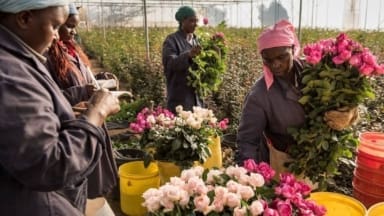
Flowers are big business. In the UK, 50% of British households bought cut flowers in 2021 and estimates for the UK cut flower and ornamental plant market, indicate a market worth of £2.2 billion. Approximately 86% of the UK market is imports, originating from the world’s largest exporters; the Netherlands, Ecuador, Colombia, Kenya and Ethiopia.
In terms of the environmental impact of the cut-flower industry, buying flowers from a local flower farmer is of course, the most sustainable option. That said, African flower growers are also acutely aware of the importance of environmental conservation, and many such as Tambuzi are actively pursuing sustainable farming practices such as water conservation, (limited) use of organic fertilisers, integrated pest management, and tracking their carbon emissions. Now certified as a B corporation, Tambuzi join the global community of environmentally conscious businesses such as such as Gaze Burvill, Aesop, Daylesford and the Body Shop, and set an example for fellow flower farmers in Kenya, and across the globe.
According to Tambuzi’s founders, Tim and Maggie Hobbs the company’s significant B corp status achievement, underscores Tambuzi’s commitment to environmental stewardship, social responsibility, and economic sustainability. B Corp Certification is awarded to companies that meet the scheme’s standards of social and environmental performance, public transparency and legal accountability.
“We are incredibly proud of our team and the collective effort that has led us to this achievement. Our B Corp Certification is not just a badge of honour; it’s a call to action to continue innovating and leading by example in the flower farming industry” said Maggie Hobbs, Co-Founder of Tambuzi Ltd.
Tambuzi, established in the 1990’s is known for growing scented garden roses and is currently the only David Austin licensed grower in Kenya. Located on the foothills of Mount Kenya, the farm grows almost 8 million flowers per year. Ideally situated on the Equator at an altitude of 1,900 meters, the area enjoys ten hours of sunshine per day with an average of 800 mm of annual rainfall – the perfect conditions for growing flowers. The company, with its three locations, set 180km from Nairobi, exports to 60 countries worldwide, including the UK, Netherlands, Australia, the US and China.
Flower production in Africa, dates from the 1970s, as they can be grown with little energy input – all year round. Kenya is particularly important source for roses, supplying one third of all roses sold in the EU. Cut flowers are now Kenya’s second largest export after tea, contributing around 1% of the country’s GDP and has become one of Kenya’s largest source of employment. Over 100,000 people working directly in the flower industry and an estimated two million indirectly. The success of the industry leads to increased revenue for local communities, which can be reinvested in the economy and social infrastructure.
Tambuzi is the biggest employer within a 30km (18.5 mile) radius and the business supports more than 3,000 people. As a certified Fairtrade farm, 10% of the sale price goes back to the workers. Tambuzi’s certification reflects its dedication to using business as a force for good and reinforces its role in sustainable floriculture.
“Achieving B Corp Certification is a testament to our unwavering commitment to sustainability and ethical practices. From the beginning, we have prioritized the well-being of our environment, our employees, and our community. This certification validates our efforts and motivates us to continue striving for excellence in everything we do” said Tim Hobbs, CEO of Tambuzi Ltd.
Key initiatives that contributed to Tambuzi’s achievement of B Corp certification:
- Sustainable Farming Practices: Tambuzi employs regenerative farming techniques to grow flowers, minimising the use artificial chemicals and fertiliser.
- Community Engagement: Tambuzi supports the local community in terms of education, healthcare, and economic development initiatives that enhance the quality of life for workers and their families.
- Employee Welfare: The company provides decent wages, safe working conditions and opportunities for professional development, fostering a positive and inclusive workplace culture.
- Environmental Responsibility: the company is committed to reducing its carbon footprint through energy-efficient operations, water conservation measures, and waste reduction programs.
